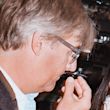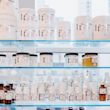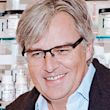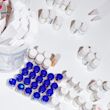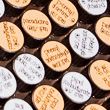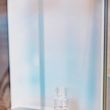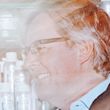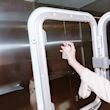As we gear up to launch our debut fragrance, Glossier You, into the world, it seemed like a good opportunity to lift the curtain a little—both on fragrance development in general, and the perfumers behind You. The art of perfume making is a difficult one, and we worked with some of the best in the business. Fun fact: They’re already the noses behind some of your favorite scents (Santal, anyone?). But fragrance is about more than just smelling. Read on, if only to put a face to the smell…
Frank Voelkl: There’s not really one way to start becoming a perfumer. For me, I started when I was a teenager in Paris. Paris is very fragrant. There were smells everywhere—a little more so than there are today. I just started to collect fragrances because I was interested. Then a friend of my parents told me about a school in Versailles, so I went there and they explained to me that there are actual people creating fragrances. It was something you could go to school for.
Dora Baghriche: The school is called ISIPCA. We both went there. When you discover the school, you do everything to get in—but you don’t know that you will be good at creating perfumes. So it’s actually quite terrifying. You start because you want to reach this big thing that is creation but you still don’t know if you’re able to do it.
Frank: It’s a great school to learn the basics. As a perfumer, the first thing you have to do is learn the ingredients—recognize them, know how to use them, and eventually, how to put them together.
Dora: It’s a lot about testing yourself and a lot of work, learning every day.
Frank: Through that, you learn what you like. We have 1300 ingredients here at the lab, and maybe I’ll use 400 or something on a regular basis. I have my favorites that I like working with and that I’m good at working with. To develop that takes quite some time.
Dora: When you first start building your own accords, it’s a very big emotion because it’s the beginning of your story—when you start building your connection and your style. But it takes a lot of time. Even now, every day I come into the lab and smell 10 different raw materials. When you smell blind, you have many more ideas then when you know what you’re smelling and have ready-made ideas. Ten by 10 every day, you gradually learn the ingredients.
Frank: In a way, fragrance is something that is not necessary but does something for your soul and your well-being. Fragrance can make you feel good, can make you feel comfortable, can you make you feel sexy–whatever you’re looking for. I have to say, I do enjoy wearing Santal 33 quite a bit. I’ve been quite involved in Le Labo and helped develop Santal, along with some other fragrances for that brand. It’s kind of exciting to walk into an elevator and smell that fragrance on somebody. It’s very recognizable and very diffusive. When somebody does wear it, it’s almost impossible not to notice it. It was almost a surprise in a way, and I’m still trying to figure out what makes Santal, Santal.
Dora: One of my latest fragrances is Mon Paris by Yves Saint Laurent. Then I’ve worked on more niche fragrances for Kiehls–I’ve made the Vanilla and Cedarwood, and Black Tea and Vetiver. For L’Artisan Parfumeur, I made Caligna–very Mediterranean, thick and jasmine. I have worked with Kenzo, Versace, Cacharel, Viktor & Rolf… Nowadays, I still don’t like to say that I have one style. I think I’m too young to be in a category and I’m very curious about a lot different smells. It really depends on who I meet in terms of clients and projects.
Frank: I’ve also had a lot of fun working on Axe—we developed a lot of the scents when my oldest son was about 13 or 14. He was the target audience, and working on something that would be worn by my son was particularly motivating. To have people across the world wearing your fragrances–if you manage to make them feel good with the products that you touch them with, that’s certainly very gratifying.
Dora: That’s something we talked a lot about when I started work on Glossier You. We were working with ingredients that were meant to smell really close to skin.
Frank: Something that was the ultimate comfort. How you want to feel day and night, every day.
Dora: It was always linked to being human, which, to me, is very strong and very emotional. But also very simple. We started by exploring this woody, musky side of the spectrum.
Frank: As much as the idea was to have a singular, linear scent, you want to have something in the fragrance that surprises people every once in awhile. Bring some kind of tension. Something that is too harmonious could be boring in the end. You want to find a way to bring texture and movement to the fragrance.
Dora: It doesn’t mean that it was boring from the beginning! Not at all. [Laughs] It takes time to add vibration and things like that. I think that’s the beauty of sharing. I share with Frank a certain love of raw materials.
Frank: When you collaborate you discover ingredients in the person you work with and wonder why they used certain materials to achieve a certain goal. I like to work with woods, so I think somehow in a lot of fragrances, there will always be something about woods. Iris is something I like to work with. Definitely the ambrox as well.
Dora: Ambrox is a synthetic molecule that mimics the smell of ambergris [ed. note: read up on that here]. It’s a very special scent. It’s woody but it also has a musky effect. It’s neither feminine nor masculine, so it’s kind of universal. Some say it’s dry, others say it’s soft. And that’s how we very quickly found the way to bring it to life.
Frank: The fragrance was almost like a raw diamond, and you want to shape the facets so it comes to life.
Dora: That’s a technical thing and a creative thing. In perfume school, you take chemistry courses because of the nature of our raw materials. You do have to be careful of the dosage of everything, and the temperature. There are technical things when you build any sort of artwork. So that’s our case too.
Frank: A good perfumer has good technical skills and a good sense of imagination.
Dora: And you need to have an idea of volatility. Because chemistry can also be poetry.
—as told to ITG
Photographed by Tom Newton.








